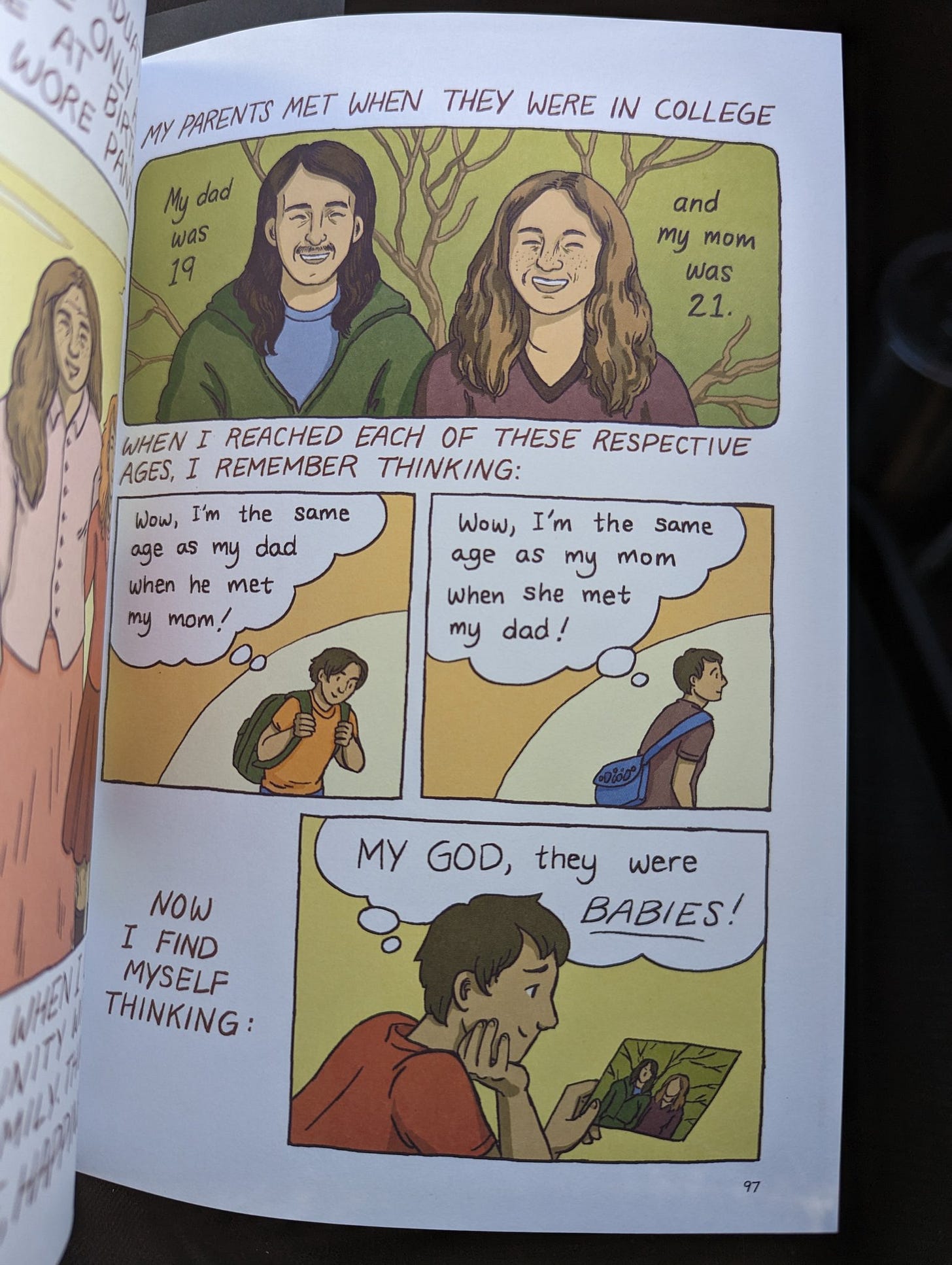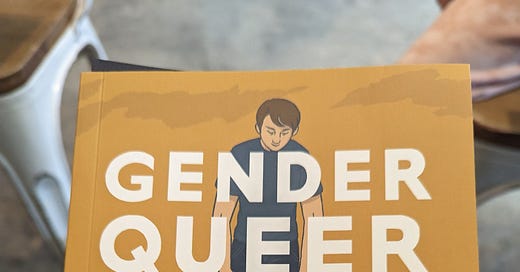Gender Queer: A banned book review
Also, 97 books on the chopping block in Beaufort County, S.C.
When I was a teenager I found out a school board member had personally removed copies of The Catcher in the Rye from my high school library because he thought it was “a filthy, filthy book,” and that sounded like reason enough for me to track down a copy and read it.
I found a tattered red paperback edition somewhere — I think it was my mom’s in high school — and read it in a few days. I remember thinking it was neither as filthy as advertised nor as revelatory as my hipster friends had claimed. I struggled to understand what this angsty prep-school kid Holden Caulfield was so jaded about, but figured Salinger was drawing on different experiences from a different time than my own.
Later, during my years as a South Carolina education reporter, I made a habit of reading whichever book conservatives were moaning about in a given year. I would give each book a little review that I usually kept to myself. That’s why I read Angie Thomas’ The Hate U Give (a compelling read for teenagers, maybe too courteous to the police) and Alison Bechdel’s Fun Home (a great American coming-of-age memoir with a surprising number of Proust references).
Inevitably when I read these books, I’d get to a passage and recognize the “objectionable content” that our most delicate political operatives were fainting onto their fainting couches about: a passage detailing an instance of racism that took place after 1964; a series of particularly naughty cuss words; a character using drugs; or, most often, a scene in which characters have sexual intercourse. I thought of the thrill the censors must have gotten, and how it was probably the same frisson I felt as a second-grader opening a dictionary to see if it had the word “shit” in it.
On vacation last month, I visited Firestorm Books in West Asheville and picked up a copy of Maia Kobabe’s Gender Queer: A Memoir solely because I knew the governor of South Carolina hated it. In November 2021, as the Moms for Liberty wave was barreling up the coast from Florida, Republican Gov. Henry McMaster wrote a letter (PDF link here) to the state education superintendent demanding censorship of Kobabe’s graphic-novel memoir in Fort Mill School District libraries because it “contains sexually explicit and pornographic depictions, which easily meet or exceed the statutory definition of obscenity.” He sent a copy of his letter to the South Carolina Law Enforcement Division.
Gender Queer follows Kobabe’s life from an idyllic childhood in rural northern California, off to college and into young adulthood and a career as an artist. Along the way, Kobabe, who was raised as a girl, comes to terms with eir gender (Kobabe is nonbinary and uses the Spivak pronouns e, em, and eir) and sexuality (e is asexual).
I read the book in a day and thought it was a well-crafted account of the author’s journey into self-understanding and self-love, presented in the accessible format of comic panels. It also struck me as a remarkably practical guide for anyone seeking to understand a fuller scope of human gender and sexuality.
In a New York Times interview last year about writing the most banned book in the country, Kobabe talked about starting the memoir as a series of Instagram comics and hearing from fans who connected: “People started responding with things like, ‘I had no idea anyone else felt this way, I didn’t even know that there were words for this.’” Forging that type of connection, ending that type of loneliness, is one benefit of a book like Gender Queer.
Another benefit is for people like me, a cisgender heterosexual guy who has honest questions about other people’s experience with gender but generally feels boorish for asking anyone but the closest of friends.
In plain language and gently cartoonish illustrations, Kobabe conveys the bristling discomfort of being misgendered. E describes in visceral detail the pain of eir first pap smear; provides a definition of autoandrophilia; gives a snappy explanation of eir nonbinary gender identity (“I don’t want MORE gendered traits, I want LESS”), and even models a way of open communication with sexual partners about what works and doesn’t work, what feels good and what feels bad. Along the way, the book is peppered with recommendations of more academic texts worth reading.
Reading this as a parent, I was moved by Kobabe’s embrace of parents and family members who tried, sometimes fumblingly, to understand what e was going through. I also bookmarked this lovely passage near the end, about conceiving of gender less as a spectrum and more as a landscape:
Some people are born in the mountains, while others are born by the sea. Some people are happy to live in the place they were born, while others must make a journey to reach the climate in which they can flourish and grow.
Between the oceans and the mountains is a wild forest. That is where I want to make my home.
These beautiful ideas are, apparently, among the most dangerous ideas in America right now.

Beaufort County’s 97 challenged books
Back in October, a small group of parents sent a list of 97 books they didn’t like to leaders in South Carolina’s Beaufort County School District. The superintendent caved almost immediately and ordered the books be pulled from school library shelves, pending a review process.
The list of challenged books is thematically incoherent and includes titles from the contemporary canon that are often assigned in high school English courses, including The Handmaid’s Tale by Margaret Atwood, The Kite Runner by Khaled Hosseini, and Water for Elephants by Sara Gruen. The complainants seem to have cross-referenced school library catalogs with the reviews on BookLooks, a right-wing website that provides content ratings and “slick sheets” so that concerned parents can rattle off a list of the naughty scenes in a book without actually reading it or buying Post-Its to stick on the pages.
The book challenge caused some chaos for Advanced Placement students who had already been assigned some of the books. It also sent district staff and community members on a journey of sorts, forming a district-mandated book review committee for each challenged book. If there is one positive outcome from all this, it’s that small groups of adults got to have book club discussions about Stephen Chbosky’s The Perks of Being a Wallflower and Rupi Kaur’s Milk and Honey.
The process is going to take months, with book reviews coming in waves. So far, the book review committees have all recommended putting the books back on school library shelves, and in each case the school board has agreed. Last night the school board voted 8-2, with 1 abstention, to restore The Perks of Being a Wallflower, The Handmaid’s Tale, Speak by Laurie Halse Anderson, Stamped: Racism, Antiracism & You by Ibram X. Kendi, and The Lovely Bones by Alice Sebold. This brings the total to 10 out of the 97 challenged books back on shelves so far.
I watched a video recording of last night’s meeting because a friend had texted me to say there would be a lively public comment session. He was right: Parents, teachers, and several high school students took the stand to defend books, especially books by LGBTQ+ authors and authors of color. A leader from Families Against Book Bans of Beaufort County gave an eloquent rebuttal to the Moms for Liberty crowd.
I was especially heartened to see five high school students speak up in defense of books. They were all members of DAYLO (Diversity Awareness Youth Literacy Organization), an advocacy group currently representing 3 schools.
I thought the most compelling speech of the evening came from Madelyn, a Beaufort High senior and DAYLO member who decided to read Jonathan Safran Foer’s Extremely Loud & Incredibly Close after seeing it on the challenged-books list. She was born years after the events of Sept. 11, 2001, and she said reading the fictional account of Oskar Schell, a young boy who lost his father in the attacks, helped her understand the pain and loss people felt at the time.
“We have not lived these experiences. We were not alive to experience the grief of 9/11. Books are how we are able to experience multiple lives and see multiple perspectives,” she said.
By my count, 4 of the 17 speakers last night were in favor of the book bans. They invariably said they weren’t trying to ban books, not really, and that they actually favored free speech. David Cook, a parent of two students, spoke ominously about his religious convictions.
“As a father I have the divine right to protect my children. It’s unfortunate at times that I have to protect my children from people that work in the schools and the materials they put in the schools,” Cook said.
He went on to echo Gov. McMaster’s legal theory from the 2021 Gender Queer letter: “Books that contain sexually explicit material are subject to the South Carolina obscenity statute. Returning these books to the libraries will complete the process of criminal intent to distribute obscene material to minors.”
That’s where they want to take this fight: They will call the cops and try to have us carted off to jail for giving the wrong books to students. You have to ask yourself if the police in your area will brush these complaints off or go along with the stated political project of the dominant political party.
***
For updates on South Carolina book bans and to help fight back, join my friends and me in the Freedom to Read South Carolina coalition. You can also follow us on Facebook and Twitter.
If you liked today’s newsletter, you might appreciate this other one I wrote about Gov. McMaster’s censorship of an essay by a transgender teenager. I reached out to the author of the censored piece, Leo Lipson, and he graciously gave his thoughts on the whole debacle:
Finally, in some unusual news, the great socialist magazine Jacobin asked permission to republish my piece from last week about the Denny’s headquarters in Spartanburg, S.C. I personally felt it was the least socialist thing I’d written in months, but hey, I’ll take the exposure and a chance to tell more people about a weird skyscraper in my home state. Here’s a link to the Jacobin online edition if you’d like to read it there.
Brutal South is a free weekly newsletter about class struggle and education in the American South. If you would like to support my work and get access to the complete archive of subscriber-only stuff, paid subscriptions are $5 a month.
Bookshop // Twitter // Bandcamp // Spotify Podcasts // Apple Podcasts





As a retired librarian,I'm greatful for your work in fighting book bans.
Also, congratulations on Jacobin picking up the piece on the Denny's skyscraper.
It was a wonderful article.
Can’t wait to read it. Thanks for the recommendation.